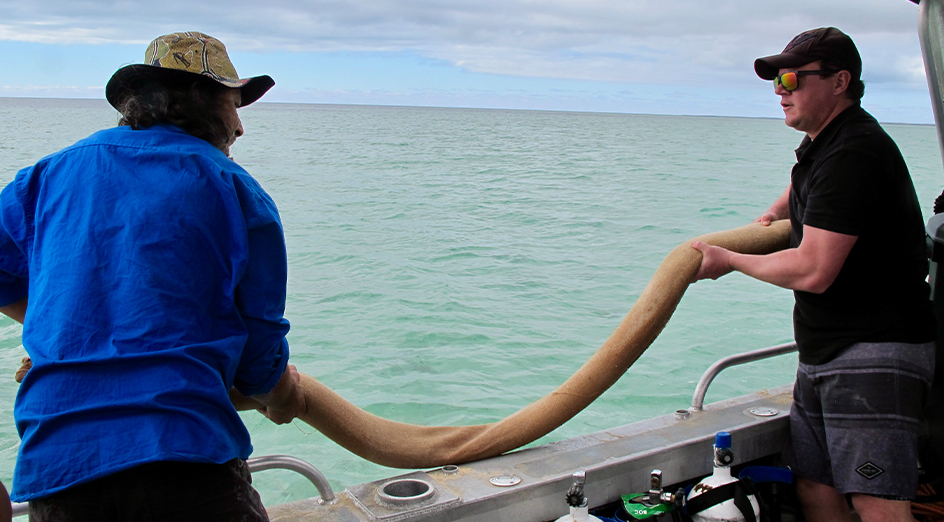Scientists from The University of Western Australia have partnered with Indigenous rangers on a seagrass restoration project in Gathaagudu (Shark Bay) to help moderate climate change and conserve biodiversity.
Dr Elizabeth Sinclair and Professor Gary Kendrick, from UWA's School of Biological Sciences and Oceans Institute, were co-authors of the paper published in Ocean & Coastal Management.
"Solutions that integrate western science and Traditional Ecological Knowledge are key to improving restoration outcomes," Dr Sinclair said.
 Image: Malgana ranger Nicholas Pedrocchi and UWA researcher Dr John Statton deploying a seagrass snagger, sand-filled hessian sock. Credit: Elizabeth Sinclair.
Image: Malgana ranger Nicholas Pedrocchi and UWA researcher Dr John Statton deploying a seagrass snagger, sand-filled hessian sock. Credit: Elizabeth Sinclair.
Researchers partnered with Malgana Aboriginal Corporation Rangers on a program that included On Country workshop-based knowledge sharing in north-west Western Australia, with a focus on seagrass restoration.
Malgana Elder, Auntie Pat Oakley said managing and caring for a living and dynamic Country are at the heart of wellbeing for all Indigenous Peoples.
"The global rate of seagrass decline continues largely due to human activities, including the widespread impacts from climate change," Professor Kendrick said.
"Reversing this decline by restoring seagrass ecosystems and the benefits they provide is challenging and can take decades, even when human impacts are reduced."
The program found with the right resourcing and logistics, there are opportunities to support training workshops that develop expertise in seagrass restoration activities in Shark Bay.
Sean McNeair, Malgana man and ranger coordinator, said field-based restoration workshops helped people reconnect with Country through two-way knowledge sharing.
"We need to empower the Malgana Aboriginal Corporation Rangers and local Indigenous led businesses to schedule restoration activities that help build seasonal local economies and increase the ability to restore seagrass at larger scales," Dr Sinclair said.
The partnership was supported with funding from the Australian Government under the National Environmental Science Program.






